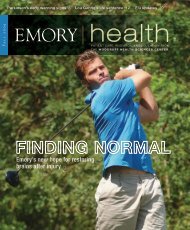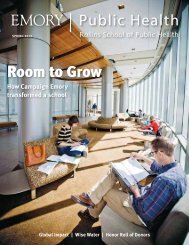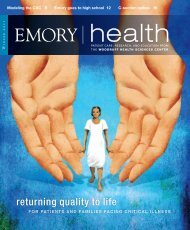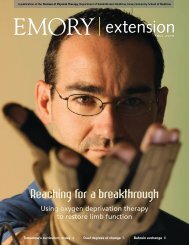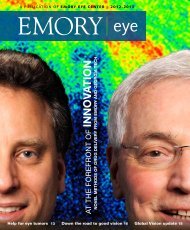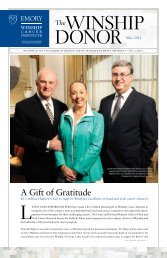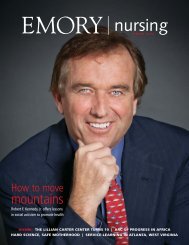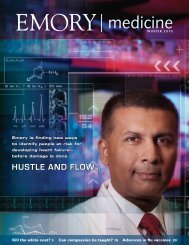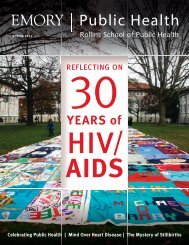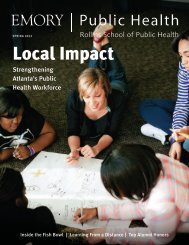medicine - Woodruff Health Sciences Center - Emory University
medicine - Woodruff Health Sciences Center - Emory University
medicine - Woodruff Health Sciences Center - Emory University
You also want an ePaper? Increase the reach of your titles
YUMPU automatically turns print PDFs into web optimized ePapers that Google loves.
Gifts & Support<br />
The right stuff<br />
Ira A. Ferguson Sr. (second from left) performs the first surgery at the new Grady Hospital in<br />
1958. Ten years earlier, he helped pioneer surgical training for black physicians in Alabama.<br />
Ira A. Ferguson Sr., 23M, never shied away from<br />
doing the hard stuff. He helped his parents run a<br />
farm and dry goods store in his native Alabama.<br />
He drove an ambulance during World War I and<br />
preserved cadavers to help pay for medical school<br />
before transferring to <strong>Emory</strong>. The first of three generations<br />
to attend <strong>Emory</strong>, Ferguson established a private practice<br />
and became a professor and chief of surgery at Grady<br />
Hospital. In the process, he tended the wounded during<br />
both world wars in Europe and championed the education<br />
of African American physicians in the segregated South.<br />
As a tribute to his late father, retired <strong>Emory</strong> surgeon Ira<br />
Ferguson Jr., 52M, provided a $250,000 gift to create the<br />
annual Ira A. Ferguson Lecture. In the first talk this year,<br />
Charles Ferguson, 76M—Ira Jr.’s son and a former <strong>Emory</strong><br />
surgeon who now teaches at Harvard—traced his grandfather’s<br />
role in what he calls “the other Tuskegee experiment,”<br />
an event overshadowed by the infamous syphilis study of<br />
black sharecroppers from 1933 to 1972.<br />
To supplement his<br />
income after World War<br />
II, Ira Sr. consulted for the<br />
Veterans Administration<br />
(VA), inspecting hospitals<br />
throughout the Southeast<br />
and conducting disastertraining<br />
courses for national<br />
defense. During visits to<br />
the Tuskegee VA Hospital,<br />
Ferguson befriended<br />
Asa Yancey, an African<br />
American physician from<br />
Atlanta and the hospital’s<br />
new chief of surgery. Yancey<br />
was eager to establish a<br />
surgical residency program<br />
but lacked the required<br />
teaching resources. Ira Sr.<br />
stepped up and organized a<br />
team from <strong>Emory</strong> to teach<br />
at Tuskegee once a week.<br />
Thus, Ferguson helped<br />
establish Alabama’s first<br />
surgical residency program<br />
for African American physicians<br />
in 1948.<br />
Ten years later, Ferguson convinced Yancey to return<br />
to Atlanta as director of the Hughes Spalding Pavilion,<br />
which served black patients at Grady. Yancey subsequently<br />
became medical director at Grady and professor and associate<br />
dean of the medical school at <strong>Emory</strong>.<br />
“Why did a young man from a small town in Alabama<br />
spend such time and effort in helping develop surgical<br />
training programs for African Americans?” asked Charles<br />
during the Ferguson lecture. “He had to overcome obstacles<br />
himself and was compelled to make things easier for others.<br />
Few 46-year-old surgeons with a successful practice<br />
would volunteer for overseas military duty, much less<br />
accompany a beach invasion force at age 49 [during World<br />
War II], with two teenage boys to support. Perhaps through<br />
such self sacrifice, one learns to truly serve others.”<br />
Online: Charles Ferguson also wrote about his grandfather<br />
in the Journal of the American College of Surgeons.<br />
To download his article, visit www.sciencedirect.com.<br />
Putting where it counts<br />
If it weren’t for a group of Atlanta golfers, pharmacologist<br />
Haian Fu might not have pinpointed how the 14-3-3zeta<br />
protein promotes lung tumor formation.<br />
His discovery, published in last year’s<br />
Proceedings of the National Academy of<br />
<strong>Sciences</strong> (PNAS), may lead to new anticancer<br />
drugs targeting the protein.<br />
Using seed funding provided by<br />
Atlanta Golfers Against Cancer (GAC),<br />
Fu conducted a pilot study, the results of<br />
which helped secure major funding from<br />
the NIH and other sources for his study.<br />
Fu is one of 10 <strong>Emory</strong> Winship<br />
Cancer Institute researchers to benefit<br />
from GAC support. To date, the group<br />
has donated more than $500,000 in seed<br />
funding for bench research, supplemented<br />
by matching funds from Winship and other sources.<br />
Support from GAC is vital, enabling Winship scientists<br />
to pursue what Fadlo Khuri calls “high-risk research”—<br />
novel studies that are less mainstream and more dif-<br />
Pursuing perfection<br />
When Ellis L. Jones,<br />
63M, was in medical<br />
school, he received a scholarship<br />
that allowed him to<br />
pursue research. Jones went<br />
on to become a renowned<br />
cardiothoracic surgeon at<br />
<strong>Emory</strong>, but he never forgot<br />
the financial freedom the<br />
scholarship brought so he<br />
could follow his true calling.<br />
“It just meant the world<br />
to him,” says Beth Jones of<br />
the scholarship to her late<br />
husband, who died of cancer<br />
in 2007.<br />
To honor him, the family<br />
has joined more than 100<br />
friends to create a scholarship<br />
in his name. They hope<br />
it will do for a medical student<br />
what Jones’ scholarship<br />
did for him—provide the<br />
ability to pursue research<br />
without financial concern.<br />
Next spring, a fourth-year<br />
medical student who is<br />
pursuing promising cancer<br />
research will be selected as<br />
the first recipient.<br />
Among his talents, Jones<br />
was known for his perfectionism<br />
in the OR and his<br />
joy in teaching residents<br />
his beloved craft of heart<br />
surgery. He trained dozens<br />
of them in the more than<br />
30 years he served on the<br />
faculty.<br />
The surgeons whom<br />
ficult to fund. “The support that GAC provides leads to<br />
substantial peer-reviewed funding from the NIH, the<br />
American Cancer Society, the Department of Defense,<br />
and other sources,” says Khuri, chair of the Department of<br />
Hematology/Oncology and a collaborator on Fu’s study.<br />
Khuri first worked with GAC while on staff at M.D.<br />
Anderson Cancer <strong>Center</strong> in Houston. The organization was<br />
formed there in 1997 when members of a local golf club<br />
banded together to support club and staff members diagnosed<br />
with cancer. Nationally, GAC has raised more than<br />
$10 million through city chapters.<br />
The Atlanta GAC supports research at Winship and the<br />
Ovarian Cancer Institute laboratory at Georgia Tech.<br />
“We continue to fund projects at both institutions<br />
because they are top quality,” says John Ray, an Atlanta-area<br />
entrepreneur whose first wife died of pancreatic cancer.<br />
“Winship has been very active in attracting top-notch<br />
research professionals around the country. I’m very optimistic<br />
about the future of Winship and the results of the<br />
work being done there today. We want to accelerate those<br />
results as much as we possibly can.”<br />
Jones trained had a tough<br />
act to follow. In 1977, he<br />
received a Tiffany clock<br />
with the inscription, “To<br />
Ellis Jones on the occasion<br />
of performing 350 consecutive<br />
and successful open<br />
heart procedures without a<br />
single death with the admiration<br />
of the whole group.”<br />
Through the Ellis L.<br />
Jones MD Scholarship for<br />
Oncology Research, Mrs.<br />
Jones hopes a medical student<br />
someday will make<br />
contributions to the field<br />
of cancer research that will<br />
gain the admiration of colleagues<br />
and peers alike.<br />
—Kay Torrance<br />
To make a gift to the Ellis<br />
L. Jones MD Scholarship<br />
Fund, contact Vicki Riedel<br />
at 404-778-5939 or<br />
vriedel@emory.edu.<br />
22 EMORY MEDICINE<br />
FALL 2008 23<br />
Ellis L. Jones



